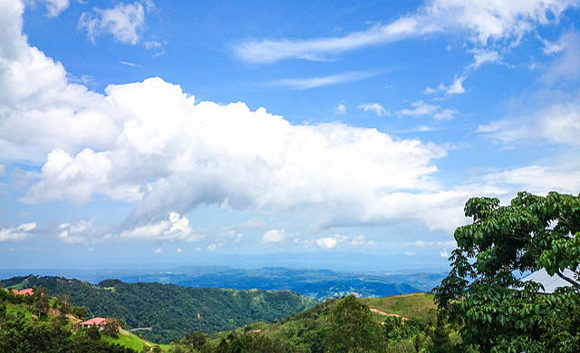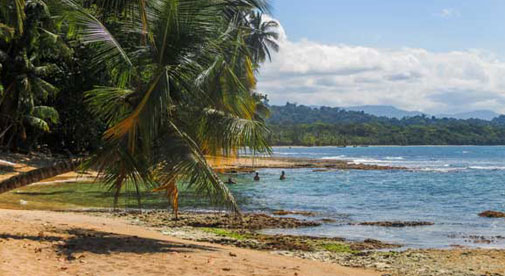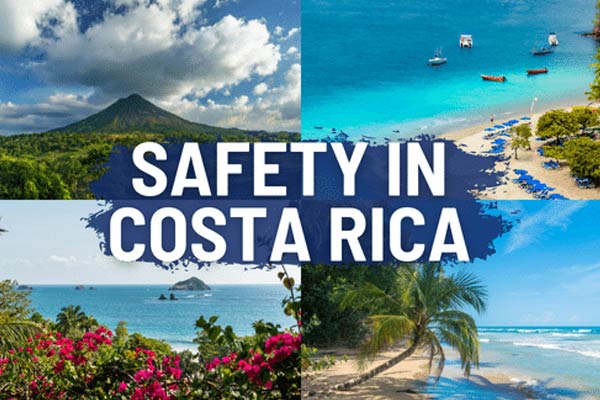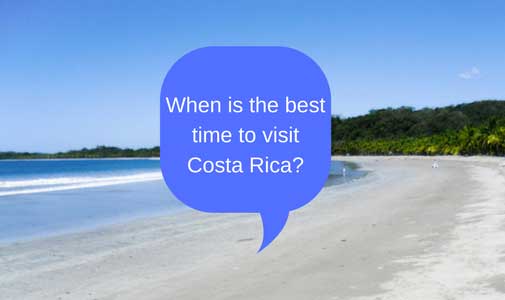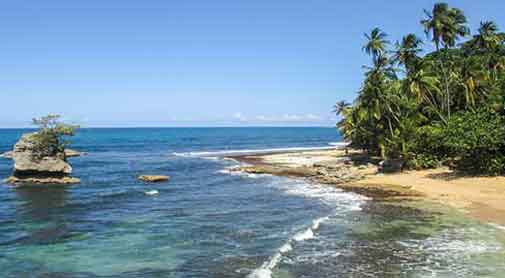There Are Many Reasons to Move to Costa Rica - How to Move and Expat Checklist
Costa Rica consistently ranks in the top five countries in the International Living Retirement Index, and it’s no wonder why. The lure of Costa Rica entices many people due to its long-established democracy, stable political scene, pristine natural environment, friendly people, and easy access to U.S. airports. Its pura vida vibe makes life more slow-paced and gives you time to enjoy the simple things.
Costa Rica’s biodiversity is unparalleled; in a country that is only the size of West Virginia, it contains about 6% of the world’s biodiversity. The country’s English translation. Rich Coast, lives up to its name. Clean and safe drinking water, reliable internet service, great surfing, lively beach towns, and lush cloud forests make Costa Rica popular with the expat community, too.
Are you interested in retiring abroad? Yes | Not Sure Yet
Applying for Temporary Residency
Here are the options and requirements to apply for temporary residency in Costa Rica.
- To apply for the “pensionado” residency for retirees, provide proof of a minimum of $1,000 per month income from a retirement fund or permanent pension source.
- The “rentista” category includes depositing $60,000 in a local or foreign bank and setting up a monthly transfer of $2,500 into a Costa Rican account for expenses over two years. Then after 24 months, you must deposit another $60,000 to restart the process.
- An “inversionista” residency requires a one-time investment of $150,000 in real estate, stocks, and bonds, or another opportunity.
- If married to a Costa Rican, you can apply for temporary residency as a spouse.
If your child is born in Costa Rica, they are a citizen. Therefore, you can apply for permanent residency as a parent. This is referred to as “residencia permanente por vinculo.”
Costa Rica has developed a new visa for working remotely and is now taking visa requests. With this visa, you don’t have to leave the country every 90 days. You can renew it for a second year as long as the holder spends at least 180 days in Costa Rica during the first year.
Dawn Lane, a local real estate agent, has seen how some people dive in, buy a property, and live happily ever after. “If you are planning to move here, you might as well start your residency process once you decide to invest.”

Get Your Free Costa Rica Report Here:
Learn more about Costa Rica and other countries in our daily postcard e-letter. Simply enter your email address below and we'll send you a FREE REPORT – Costa Rica: The Land of Pura Vida
This special guide covers real estate, retirement and more in Costa Rica and is yours free when you sign up for our IL postcards below.
How to Enter Costa Rica
With the ease of two international airports, one in Liberia and one in San Jose, there are convenient daily flights from North America and Europe. You can legally stay in the country for 90 days as a tourist, and some people start their move using this option. Once your time is up, you can take a day trip to neighboring Nicaragua or Panama for another 90-day stay.
Costa Rica is a popular destination for retirees. Yet these days, people don’t always wait until retirement to move to another country. No matter the route you go, after having temporary residency for three years, you can apply for permanent residency.
A permanent resident can work legally in Costa Rica, while a temporary resident can own or run a business but has to employ locals to do any labor. Both types pay into the CAJA, Costa Rica’s health care system.
Preparing to Move to Costa Rica
Spending an extended amount of time checking out different zones and experiencing the weather changes is advisable. In addition, Nicole Rangel, an expat living in Costa Rica for five years, suggests, “try to move in the low season for more options and lower prices.”
Being on vacation is very different from living in a country, so check out some things you need to make daily living more comfortable.
Here is a list of topics to research:
- Internet service
- Banks
- Finding a good lawyer and accountant
- Buying a car
- Mail options
- Cell phone and international calling options
- Food options
- Clothing and household options
- Community events
- Education options
- Medical, dental, and pet care
- Extracurricular activities
- The weather throughout the year
- High and low season months depending on location
Moving Checklist
Moving to Costa Rica is an excellent reason to adopt a minimalist lifestyle. Spending time in nature and out with friends becomes the focus. Nicole Rangel says, “When I moved to Costa Rica, I downsized and reevaluated my lifestyle, including breaking free of the need for certain products and foods.”
Here are areas to focus on starting about six months before your move.
Packing List
What will you store, sell, give away, and take with you? Take Marie Kondo’s advice; if something doesn’t spark joy, don’t keep it!
Shipping
If you plan on sending down a container, vet a company by talking with some of their past clients. Expats are eagerly awaiting the implementation of Law N. 9996, passed in July 2021, allowing new inversionista, rentista, and pensionado residents a one-time tax exemption on imported household items and vehicles.
Passports
Ensure that your passport is not close to expiring; although renewing passports through the U.S. Embassy in San Jose is straightforward, it can be one less thing on your list while settling into a new place.
Pets
Research the paperwork and airline policies needed. There are many local vets and access to good pet care.
Residency Paperwork
If applying for residency, your residency lawyer will provide you with a list of the documents you will need to gather in the U.S. Remember that some documents are only valid for a set time from issuance.
Medical Appointments
Schedule physicals, bloodwork, and vaccinations before your trip. Make copies of your records.
Renew Your Driver’s License
Arrive in Costa Rica with an up-to-date license to deter any future hassles.
Set up bank Accounts and Credit Cards
Use cards that offer free ATM withdrawals in foreign countries, such as Capital One 360 Account, and Charles Schwab. An award-based credit card with no foreign transaction fees is also a plus.
Do Your Research
Become part of Facebook groups and read all the information International Living publishes about Costa Rica.
Purchase Insurance
You may plan on using the CAJA, but it is only available once you are given temporary or permanent residency. So, during the process, you may need to purchase international or private health insurance.
Moving Your Household Goods
No matter where you move to, transporting household goods and personal belongings can be challenging. For a move to Costa Rica, for example, you can choose an American moving company, but that firm will still have to deal with a local relocation company to deliver your goods in Costa Rica, a process that can entail tedious dealings with bureaucracy. To avoid this problem, experienced expats say the best strategy is to first select the Costa Rican shipping broker. This firm will then choose the American company that it wants to work with. You can bring a full 40-foot container of goods, including your car. Or you can share a container with another expat. You also have the option of shipping smaller crates. Some expats liberate themselves and bring only what they can fit in their suitcases. It’s important to think long and hard about what possessions you’ll bring to Costa Rica.
Moving With Your Pets to Costa Rica
There are no quarantines for pets arriving in Costa Rica. And bringing your pet to the country is a relatively easy process. A rabies vaccination is required for pets that enter Costa Rica, and it must be administered within 30 days of departure. You’ll also need to have your veterinarian fill out and sign the APHIS 7001 International Health Certificate from the United States Department of Agriculture stating that your pet is in good health. Small dogs and cats can ride in a carrier under your airline seat (subject to rules for your specific airline—always ask). Larger dogs can ride in crates with the luggage. There are extra fees involved in transporting pets. You can also hire a pet shipper to handle your pet’s transport on a charter plane or send them cargo unaccompanied—an import permit will be required in that case. Keep in mind that some breeds are restricted from flying for health reasons. And if temperatures are too high anywhere on your itinerary, the pets may not be allowed to fly. Again, check with your airline. Birds require additional paperwork.
Can You Take Firearms to Costa Rica
The admission of firearms and ammunition into the territory of Costa Rica is subject to restrictions and import permits approved by Costa Rican authorities. At this time only citizens and permanent residents of Costa Rica may possess firearms. Permanent residency is possible after three years as a temporary resident, in the pensionado category, for example. Applications to import non-military weapons into the country may be filed by or through a licensed importer, authorized dealer, or a particular person. You must register your weapon at the Ministry of Public Security’s Department of Firearms and Ammunitions once you arrive in Costa Rica. You must also pass criminal background check, psychological test, and firearms safety test.
When you take into account all of these factors and the fact that in Costa Rica you will surely enjoy a more peaceful and laidback way of life, it’s hard to understand why everyone isn’t moving to Costa Rica.

Get Your Free Costa Rica Report Here:
Learn more about Costa Rica and other countries in our daily postcard e-letter. Simply enter your email address below and we'll send you a FREE REPORT – Costa Rica: The Land of Pura Vida
This special guide covers real estate, retirement and more in Costa Rica and is yours free when you sign up for our IL postcards below.
Where to Live in Costa Rica?
Finding your first accommodation and searching for your new home is a process. Although you can look online, there is nothing like being in the country for first-hand experience. Facebook groups share rental opportunities and properties on the market; talking with people in the area is always a good option.
Dawn Lane tells her clients, “If you have a low threshold for change, challenging situations, or fear of the unknown, you might want to rent first and explore as there are many micro-climates.”
Do I Need Vaccinations Before Moving to Costa Rica?
No immunizations are required when entering Costa Rica from the U.S, Canada, or Europe. People entering Costa Rica from a South American or African country where Yellow Fever is endemic, must show proof of being vaccinated at least a week before their travel date.
You may need a tetanus booster, and depending on whether you plan on traveling outside of Costa Rica, you may need typhoid and Hepatitis A vaccines.
At this time, there are no COVID-19 restrictions in the country.
Banking and Finance in Costa Rica
Banking in Costa Rica is often a practice of patience. Depositing money into your account could take an hour or two. These long waits help you appreciate those rare days when you get in and out quickly.
A representative at Banco Nacional shared that non-residents can open a bank account with a passport, an up-to-date visa, and a reference letter from someone who banks at BN and knows you in some commercial capacity, such as your landlord. Each bank has its requirements, so find out what you need according to the bank you choose. Some non-residents can only open an account if they have a corporation.
A foreigner can get a mortgage with a bank, but there may be better options without high interest with variable rates.
There are various options for foreigners to finance a house in Costa Rica.
- Local banking has public and private options. Banco Nacional and Banco de Costa Rica are the top banks for real estate. For private options, BAC San Jose, ScotiaBank, and CitiBank are the largest.
- Some developers offer owner financing.
- Foreign mortgages are increasingly becoming more popular for property in Costa Rica. Some U.S. lenders will finance/refinance a finished home.
Things I’d Wish I’d Known Before Moving to Costa Rica
It is helpful to learn from people who have already moved. Sharing is caring! Here are some things I wished I’d known before moving to Costa Rica!
Feeling Like Part of a Community is Life-changing.
Finding your community in Costa Rica often involves meeting like-minded individuals looking for a slower-paced life and prioritizing time in nature.
Molly Ruland has found her community in Tilerán, with a fantastic view of Volcán Arenal and its lake. “I’m very, very grateful for the friendships and the community that exists here. Many more full-timers have moved in, and I love our community garden!”
There are numerous opportunities to connect and share with the local community. Mary Byerly from the Tamarindo area says, “Over the years, I’ve taught yoga at a local school and classes for local women. I also have been volunteering with a local senior group for the past eight years.”
Speaking Spanish is Helpful.
The amount of Spanish you hear depends on where you live in Costa Rica. Ed Novak, who lives in Turrialba, shares, “I have not run into many expats where I am now staying. More Spanish would make it easier, but life is doable with minimal Spanish.”
Living in the Central Valley means immersing yourself in Spanish. For those living on the beaches of Guanacaste, one can find themselves in an ‘English bubble’ due to the high number of tourists and English-speaking expats in the area.
Costa Rica’s Seasons and Terrain Change Depending on Where you are.
Due to the many microclimates in Costa Rica, there are drastic changes in terrain and weather within short distances. From the Gold Coast at sea level, a three-hour trip gets you to 1,300 meters elevation in Monteverde, and a cooler climate. On the other hand, the Caribbean Coast is flatter and more humid.
Learn to use the different seasons to your advantage. If the rain is too heavy in Guanacaste in September and October (the peak of the green season), travel to the Arenal and Caribbean areas since that is their dry season.
Soft, Fluffy Towels are a Simple Luxury.
Using a towel that quickly absorbs the water on your body after a shower is something I never appreciated until using towels purchased in Costa Rica. Many towels in Costa Rica don’t wick the moisture away from your body. This issue has an easy fix. I usually bring back some towels in my suitcase when I travel.
Video: Why I Moved to Costa Rica
By Kathleen Evans
In the video below our Costa Rica expert Katheleen Evans discusses the list of criteria she made of what was important to her when choosing her potential new home country and just why Costa Rica met all of her needs and expectations.
Transcript:
I had the travel bug from an early age, from studying overseas to extended vacations with my family, and I really wanted to embrace a new culture. Back in the early ‘90s, I started subscribing to International Living magazine. Never in my wildest dreams did I think I’d actually become a correspondent for IL and live in a foreign country. But my husband, Steve, and I, read the magazine diligently, and whenever we traveled, we checked out the various countries it mentioned. So, on and off, we did a lot of research and finally started to get a little serious about it from 2008 to 2010.
We finally said, okay let’s make a list of criteria about what’s important to us and what we want our new home country to be like. I have written down our criteria again to share with you.
First off, I wanted to hear and see the ocean every day. I grew up fairly landlocked and spent most of my life that way. So it was really important to be able to hear the ocean, there is something hypnotic and soothing about it.
Number two, I never wanted to wear a coat again. Now, that may sound kind of funny to some of you, but I grew up in the brutal winters of Chicago, and it was a pretty painful experience. I’m one of those friends that when it’s 60 F, I’ll show up in a coat and gloves.
We also wanted a country with a stable democracy and an educated population. These were important to us. And we wanted to be able to qualify for residency and have the process be fairly straightforward. Costa Rica does have three different easy pathways to residency and we qualified for one of them, even though we’re not at pensions years yet.
Next on our list was access to a universal healthcare system. Both of us worked independently. For once, we were going to leave our corporation so we wouldn’t have healthcare and that became something very important to us, especially looking at the next phase of our life.

Get Your Free Costa Rica Report Here:
Learn more about Costa Rica and other countries in our daily postcard e-letter. Simply enter your email address below and we'll send you a FREE REPORT – Costa Rica: The Land of Pura Vida
This special guide covers real estate, retirement and more in Costa Rica and is yours free when you sign up for our IL postcards below.
We wanted clear title to property and to be able to own it outright as a foreigner. There are some countries around the world that don’t allow you to do that. However, Costa Rica does, whether it’s a business, your own personal residence, or even just an investment property. Any foreigner can buy. We also wanted a place that had expat communities, not to live in a specific enclave with just expats, but we wanted someone who had already been a pioneer who had helped pave the pathway to make life a little bit easier. We also wanted welcoming locals.
Ease of travel back to the U.S. was also important to us. Should we need to get there quickly, Costa Rica to Miami is just two-and-a-half hours. Houston, is just three-and-a-half hours. So the flights are easy. They’re frequent and they’re not that expensive. We also wanted to look at a lower cost of living than what we had in the U.S. Now I hear it time and time again that Costa Rica isn’t one of the cheapest options for expats, and that is true. But overall, when we look at our budgets, it’s probably half of what we would be spending overall, including everything, especially property. We also wanted to be able to drink water safely out of the tap. And that’s not one of the things that people think about often. But when you look at some of the more rustic options for expats, that does become an issue. And you do have to have some sort of filtration system.
Finally, we wanted to live in a place that had access to the arts, and entertainment. We were looking at various countries and several of the Caribbean islands. They’re appealing in so many ways. However, we found that it would be very possible to get kind of bored with just island life. We are social people, we like to go out, go to museums, concerts, and that sort of thing. In Costa Rica, even some of the smaller beach communities do offer a variety of different things.
So we got real serious with that criteria list. And over time, checking various countries, we kept coming back to Costa Rica and we realized that it checked every possible box for us.

